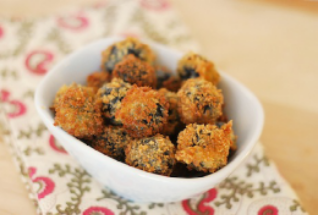Black Olives - Good and Good For You!

They've always been a special side dish, garnish, exotic accompaniment to our holiday dinners, or an ingredient in some of my Italian or Mexican dishes. I've never thought of serving them on a regular basis, though. But now that I know about their wonderful health benefits, I'll be serving them more often. Here's why:
Turns out, our diet can also protect our skin. For instance:
They promote digestive health because of being a good source of soluble and insoluble dietary fiber. About 3.5 ounces of ripe olives provides 3.2 grams of total dietary fiber. (The recommended daily intake of fiber is 38 grams for men and 25 grams for women up to 50 years old.) Soluble fiber helps lower blood cholesterol and glucose levels, while insoluble fiber adds bulk to stools and promotes the movement of material through the digestive system.
They contain iron, about 3.30 milligrams of iron per 3.5 ounces. The RDA for iron for adult males is 8 milligrams per day and 18 milligrams per day for females. The body needs iron to make hemoglobin and myoglobin, the oxygen-carrying proteins. Red blood cells contain hemoglobin and muscle cells contain myoglobin. Iron makes up part of many proteins in the body and helps produce adenosine triphosphate or ATP, a main energy source.
They contain vitamin E. A 3.5 ounce serving of ripe olives has about 1.65 milligrams of vitamin E, a fat-soluble antioxidant that protects cells from the damaging effects of free radicals. Vitamin E is also involved in immune function, regulation of gene expression, cell signaling and other metabolic processes. Research says vitamin E helps prevent coronary heart disease, blood clot formation, and inhibits oxidation of low-density lipoprotein or LDL cholesterol.
They promote cardiovascular health, because they contain high amounts of healthy monounsaturated fats-nearly 8 grams of total monounsaturated fats per 3.5 ounce serving. The American Heart Association states the majority of our fats should come from monounsaturated or polyunsaturated fats. Monounsaturated fats help reduce bad cholesterol levels in the blood and lower the risk of heart disease and stroke. According to MayoClinic.com, monounsaturated fatty acids benefit insulin levels and blood sugar control.
One consideration, though: While black olives provide many health benefits, they are relatively high in sodium and calories. A 3.5 ounce serving of ripe olives provides 115 calories and about 735 milligrams of sodium. The 2010 American Dietary Guidelines recommend that adults consume no more than 2,300 milligrams of sodium per day.
Now about OVEN FRIED BLUE CHEESE-STUFFED OLIVES, as an unusual and exceptionally tasty way to serve them up, now that the science is out of the way? How about blue cheese-filled, oven fried black olives? I'd never heard of such a thing until my friend, Nola, sent me the recipe. She doesn't know where on the Internet it came from, so I can't give credit, but I can bet the olive-lovers out there will be thrilled to have this recipe!
The mystery recipe creator suggests instead of filling the center with blue only cheese, try a mixture of blue cheese and cream cheese.
Oven Fried Blue Cheese Stuffed Black Olives
Ingredients:
| 1 (15-ounce) can | jumbo pitted black olives |
| 1 1/2 ounces | blue cheese |
| 2 tablespoons | cream cheese |
| 1/8 teaspoon | black pepper |
| 1 | egg |
| 1 cup | Italian-style bread crumbs |
| Canola oil cooking spray |
Directions:
Preheat oven to 400°F. Coat a 9 x 9-inch baking dish with canola cooking spray. Add blue cheese, light cream cheese and black pepper to a small bowl and blend well. Using your fingers or a pastry bag, fill each olive with the blue cheese mixture.
In small bowl, beat egg well. Place breadcrumbs in a shallow bowl. Dip olives in egg then roll in the breadcrumbs to coat well. Place olives in prepared dish and coat the top with canola cooking spray. Bake in center of oven for 12-13 minutes or until golden brown. Cool before serving.
- https://romanlosangelez.wordpress.com/
- www.powersdistributing.com
 Alice Osborne
Alice Osborne
Weekly Newsletter Contributor since 2006
Email the author! alice@dvo.com

